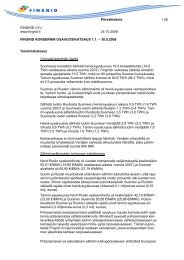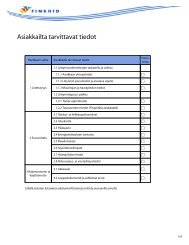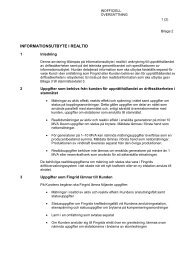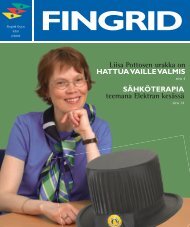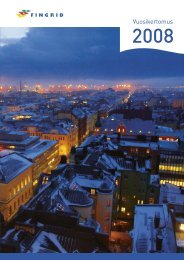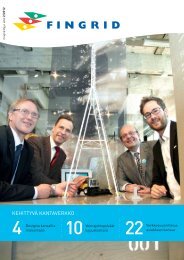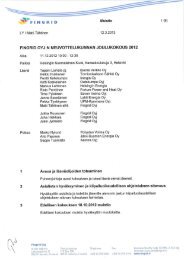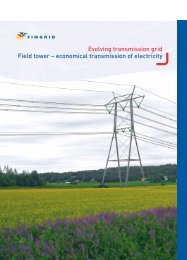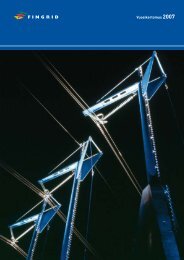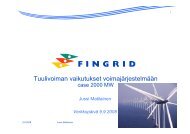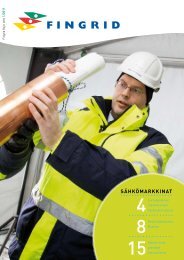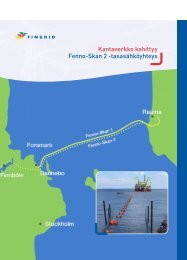2/2012 - Fingrid
2/2012 - Fingrid
2/2012 - Fingrid
You also want an ePaper? Increase the reach of your titles
YUMPU automatically turns print PDFs into web optimized ePapers that Google loves.
EDITORIALCOMPETITIVE TRANSMISSION SYSTEMat competitive tariffsThe energy infrastructure is animportant competitive factor forFinland. We have learned it thehard way that our society requires moreand more from electricity networks. Thisis so because the dependence of societyon electricity and its sensitivity to disturbanceshave increased substantially.The updating of our existing electricitynetworks calls for considerablefinancial input. With <strong>Fingrid</strong>’s system,the price tag is about 1.7 billion eurosduring this decade. A correspondingupdate was carried out most recently inthe 1970s, when electricity consumptiongrew rapidly and large coal andnuclear power plants were connected tothe grid.Our heavy capital investment programmetogether with a rise in marketbasedcosts has created a pressure toincrease the transmission tariffs. Thetariffs were raised by 30 per cent at thebeginning of this year. Our customersreferred to this raise as “huge”, althoughthey understood why the raisewas needed.The reasonableness of the transmissionfees levied by <strong>Fingrid</strong> is monitoredby the Energy Market Authority. In accordancewith the regulation model applied,<strong>Fingrid</strong>’s owners have the rightto a reasonable return on the basis ofthe capital invested in the transmissionsystem. Our owners have decided thata level of return allowed by the regulationmodel will be gradually introducedduring the regulatory period of <strong>2012</strong> to2015. This will translate into annual tariffadjustments.Simply put, the tariffs are determinedby the regulation model and based onthe company’s cost level. A cost-effectivecompany has a lower tariff. <strong>Fingrid</strong>’scost control measures also serveour customers. Our key objective is toretain our transmission prices at a levelwhich is competitive on a Europeanscale. We are determined in improvingour organisational performance. We reporttransparently the trend in factorswhich influence our financial performance.We also measure our cost efficiencyby participating in internationalbenchmarking studies.We do everything we can to avoidunnecessary investments. Firstly, wefollow the principle of transparency interms of our capital investment programme.On the other hand, the programmeschedule is mostly determinedby the completion times of new electricitygeneration facilities. Future investmentsin power generation capacity involvemany political and market-relateduncertainties. This is why we make thedecisions concerning the transmissionsystem investments only after a customerof ours has made its own investmentdecision.Such a just-in-time approach involvesa schedule risk. What if the generationplant is ready before its connection tothe transmission system? In order tocontrol the risk, we carry out the environmentalimpact assessments, permittingprocesses and necessary preliminaryplanning in advance. Thisapproach also facilitates the serviceproviders, because most of the uncertaintiesrelated to the schedules havebeen eliminated through the work carriedout in advance. This is reflected inthe prices of work and equipment. Andultimately it is our customers who drawthe benefit.This year has shown that <strong>Fingrid</strong>’s financesalso involve a number of uncertainties.It is really difficult to forecastelectricity consumption in the currenteconomic situation. The market pricesof power system reserves have increasedrapidly. There should absolutelybe more competition and new playersin the reserve market, both among electricityproducers and users. The volumeof electricity imports from Russiahas dropped dramatically as a result ofthe capacity compensations introducedthere, so our cross-border income hasreduced correspondingly. Somewhatparadoxically, our finances have beenrelieved by the record-high congestionincome resulting from the inadequacyof cross-border transmission connections.On the other hand, these congestionshave also disturbed the electricitymarket mechanisms.In the future, operational and investmentefficiency can be enhancedthrough closer co-operation betweenthe players in the industry and by findingnew kinds of shared procedures. Amore active contribution of electricityconsumption to the security of supplyis one possibility, as are investmentsto be made in reserve power capacity.Co-operation enables us to keep up ahigh level of security of supply costeffectively– to benefit our customersand society.Jukka RuusunenPresident & CEOFINGRID 2/<strong>2012</strong> | 3



